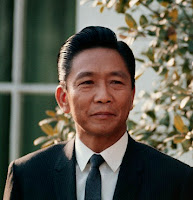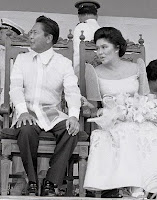Branding the Philippines Part II: turning a commodity into a premium product
 Blogger Paul Farol recently brought to my attention an initiative to develop a "brand" for the Philippines. The initiative is being championed by a certain EON Philippines which, according to its website, is a "stakholders relations firm". EON have written a whitepaper, "Branding the Philippines: Championing the Filipino" that consolidates ideas brainstormed in a recently held forum that included representatives from various business stakholders in the Philippines (chambers of commerce, business clubs, industry associations, etc.).
Blogger Paul Farol recently brought to my attention an initiative to develop a "brand" for the Philippines. The initiative is being championed by a certain EON Philippines which, according to its website, is a "stakholders relations firm". EON have written a whitepaper, "Branding the Philippines: Championing the Filipino" that consolidates ideas brainstormed in a recently held forum that included representatives from various business stakholders in the Philippines (chambers of commerce, business clubs, industry associations, etc.).The paper basically makes several recommendations around the branding approach to be taken...
* * *
(1) Focus on people.
Filipinos are the brand. The Filipino is the Philippines’ best asset which can compete with any value proposition of other countries.
(2) Highlight four key positive characteristics (the "4C's").
- Caring
- Creative
- Collaborative
- Colorful
(3) Identify the Filippino "essence".
- Relationship-oriented
- Values home
- Celebratory
* * *
... and suggests these be supported through an Executive Order creating a government body reporting to the President to (1) oversee establishment of the brand, (2) develop and implement branding strategy, and (3) form an organisational structure headed by the Secretary for Communications (Messaging) who will effect a "tripartite collaboration" approach to enlisting the participation of "private sector and civil society".
For the most part, Paul's insightful reaction to the paper (EON had opened the paper to public commentary) can be encapsulated in a simple expression
Lipstick on a pig does not change the fact of the pig.
Specifically:
In conclusion, by getting our acts together first, it will be easier to sell our country without having to spend so much on brand promotion that inevitably may just turn into so much fairy-dust once the shit-hits-the-fan (another bombing, another hostage crisis involving foreigners, another massacre, another natural disaster, another slew of foreign investments deterred by 'protectionist' policies, etcetera).
This echoes an earlier piece of mine where I cited the Inquirer.net Editor's view on our efforts to brand ourselves as an el primo tourist destination:
To get the wow, one has to earn the wow [alluding to the successful "Wow Philippines" tourism slogan that the Department of Tourism (DOT) under the current administration tried and failed to replace]. In that sense, the DOT has a lot more to do than merely change its slogan or, for that matter, offering up a new website.
Generally speaking, the DOT needs to do a much better job with its maintenance of various crumbling tourist spots and protection of the country’s natural treasures. Maybe if the DOT were already doing those things well, people wouldn’t mind the bizarre new slogan [whose release led to the downfall of former Tourism Secretary Vicente Romano], no matter how wayward it is.
A comment I made on Paul's article dared beg to differ slightly with the view that shaping up necessarily precedes the showcasing. There are, after all, cases where shrewd brand marketing did manage to get people to focus on the lipstick and ignore the pig behind it. An example of this is the way cigarettes are marketed.
But I offer a slightly more positive flavour of this angle -- one that capitalises on what is real:
If we just have to come up with a "brand", we don't need all those characters that what's-his-face branding consultant recommends we engage. Their approach sounds like some kind of perverse management-by-committee on steroids (with the proportionate price tag attached!).
There's this ProPinoy.net article that is partially spot on and the insight is right on its title "Finding Your Niche", where I submitted this comment:What's our biggest export? People. What is our most valuable industrial input? Labour-added-value.
In short, our niche is people and labour.
The challenge is to UPGRADE these into premium offerings to the market from the current low-grade commodity prices these command.
Identify the key success factor to meeting that challenge, and THAT then becomes our brand.
In a sense, an alternative analogy to the cigarette marketing example that could be applied here is water. Water is in essence a dirt cheap commodity and, for some, virtually free. And yet, some bozo came up with what would go on to become an immensely profitable idea: why not bottle it and sell it for a hundred times its value pound-for-pound!
Business Sense 101 at its best.




I'm about to hit this topic myself, having been encouraged to do so by several people. Your and Paul's treatments are positively friendly compared to the storm of nastiness I am preparing to unleash. Utter garbage, this entire exercise was.
ReplyDeleteMan, I'm losing my edge...
ReplyDeleteThat didn't come out right. I didn't mean your exercise, of course, I meant theirs. For the number of people who should know what they're talking about who were involved, and the amount of money that probably got thrown at this, one has to ask, "Is that the best they can do?"
ReplyDeleteI think it's the number of participants in the forum. My experience with "bainstorming" forums is that sharpness of outcome is inversely proportional to number of participants.
ReplyDeleteOr perhaps this was more a brainSTEMstorming exercise in this case (apologies to Gary Larsen). :-D
I came up with two slogans for the Tourism and Investments sectors, just for kicks.
ReplyDelete"Philippines: Seven Thousand Wonders."
"Philippines: Building Partnerships Through Investment."
Hell, I came up with those on a whim AND assuming 60/40. How is it that an entire committee couldn't!?